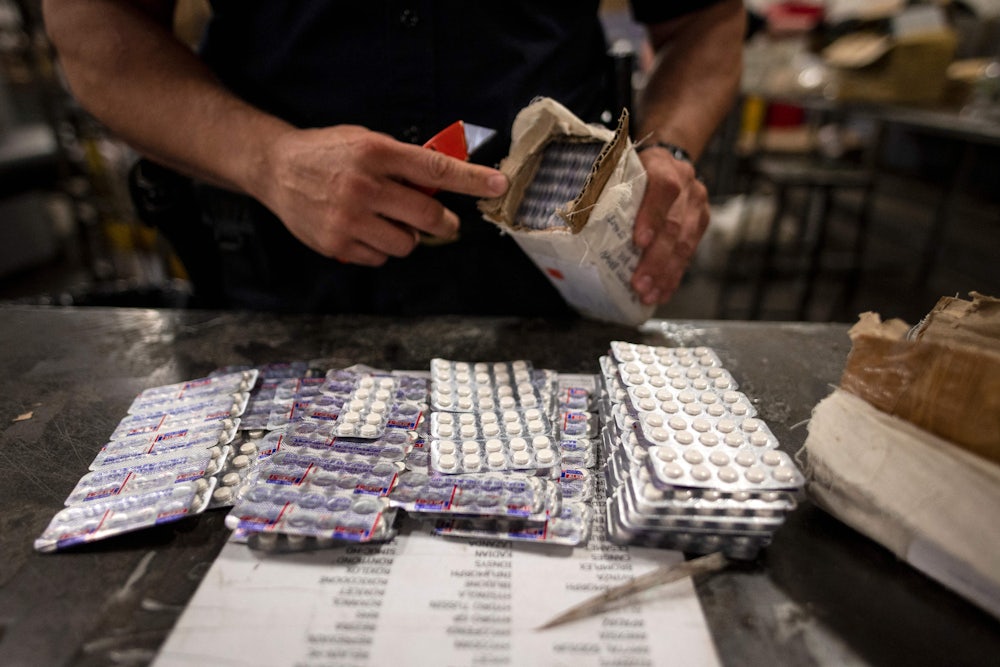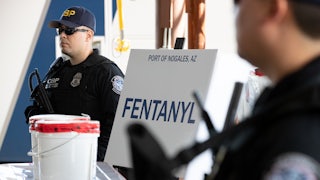When Republicans officially took control of the House earlier this month, conservatives wasted little time before making it clear that drugs—a combination of serious looks at the overdose crisis paired with the “war on drugs” politicking about the southern border—would be a top priority. Last week, House Republicans wrote a letter to the Drug Enforcement Administration and Customs and Border Patrol requesting action on the overdose crisis. The same week, the House Energy and Commerce Republicans hosted a roundtable “to discuss the worsening fentanyl crisis” and its relationship to border security, and they invited parents from Pennsylvania who lost their 23-year-old son to a fatal overdose to testify on the topic.
During the marathon of speeches to elect Kevin McCarthy as House speaker, Republicans frequently invoked fentanyl and the southern border. “Last year alone we lost over 100,000 young people to deaths from drugs like fentanyl because we have an open southern border,” Representative Steve Scalise said in a speech supporting McCarthy. “Everybody should be appalled by that stat.”
“Given the zeitgeist in many American communities, it’s brilliant messaging,” said Brandon del Pozo, a health and medicine professor at Brown University and former police chief of Burlington, Vermont. “It shows sympathy for the countless people who’ve lost loved ones to overdose without fixing blame on them, it taps into the nation’s retributivist vein, it capitalizes on and stokes xenophobia, and it lays blame at the feet of the current administration. It communicates a lot of rhetoric, very economically.”
While harping on the usual talking points about getting tough on China and securing the southern border, House Republicans are initially trying to strike a softer tone. “We must do whatever we can to reduce the stigma attached to substance abuse disorder and addiction,” Florida Representative Gus Bilirakis said at the Energy and Commerce roundtable. “We also must ensure that treatment is readily available for those in need, and we’re working on that.”
In 2018, House Republicans passed the SUPPORT for Patients and Communities Act, which aimed to curtail the supply of prescription opioids. But by then, the overdose crisis had already shifted to illicit fentanyl, as well as stimulants like meth, and away from pharmaceutical opioids. In 2018, roughly 67,000 people died from overdose deaths; in 2021, more than 100,000 people died from drug overdoses, primarily from illicit fentanyl mixed with other substances.
Caught in a game of drug war whack-a-mole, House Republicans are now seeking to permanently place all fentanyl-related substances in Schedule I, the strictest government control. “It should be a priority,” said Bilirakis of Florida. “This is poison. It’s a weapon of mass destruction”
During the hearing, House Republicans criticized President Biden and the Democrats for refusing to “secure” the southern border, and for blocking previous GOP efforts to permanently schedule all fentanyl-related substances. “Our border patrol agents are now social workers,” Ohio Representative Bob Latta said.
Republicans frequently frame the overdose crisis as a result of immigration and “open borders.” But a recent study, which found that overdose deaths remained steady or actually declined in areas where immigration has increased, undermines this narrative. Rather, illicit drugs like meth, cocaine, and fentanyl enter America through legal ports of entry, where millions of trucks carrying goods (and drugs) pass through each year. Roughly 90 percent of all drug seizures occur at these ports of entry, and do not involve immigrants or asylum-seekers arriving at the border.
House Republicans have said little about harm reduction or overdose prevention centers, some of the best methods to prevent fatal overdoses by offering services to people actively struggling with addiction. During the Energy and Commerce roundtable, one of the invited panelists, Dr. Timothy Westlake, urged lawmakers to “deploy every overdose prevention and harm reduction tool in our arsenal.”
Consumption sites are recognized around the world as a helpful tool in the arsenal. But in America, there is a well-funded effort to derail this and other harm reduction tools. The Department of Justice has until February 6 to respond to a lawsuit involving Safehouse, a nonprofit that has been vying to open a consumption site in Philadelphia since 2018. In 2019, Safehouse was sued by a federal prosecutor appointed by President Donald Trump, which blocked the site from opening.
Pennsylvania Representative John Joyce, leader of Energy and Commerce Republicans, said the committee will be writing new bills that target fentanyl trafficking, all but ensuring that this never-ending game of drug whack-a-mole continues.


